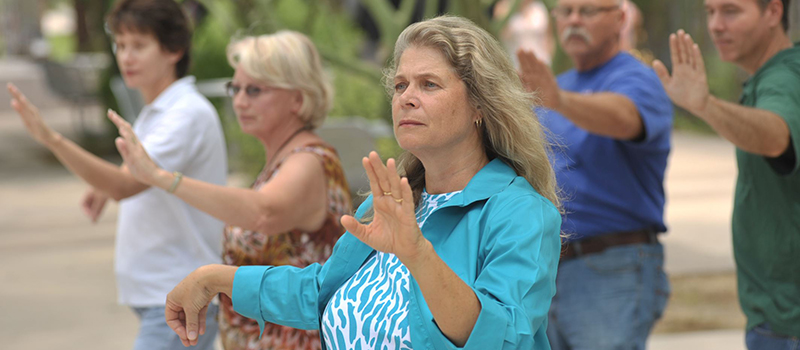
Seniors, health care professionals and others can come learn about the benefits of Tai Chi to healthy aging with Ruth Taylor-Piliae, PhD, RN, FAHA (pictured above), who will speak Monday, Sept. 12, at the newly relocated University of Arizona Center on Aging’s Advances in Aging Lecture Series, which have a new time and locale.
The Advances in Aging lectures returned in August to Central Tucson at Kiewit Auditorium in the Leon Levy Cancer Center building adjacent to the Banner – University Medical Center Tucson hospital.
The popular lecture series had been held since 2012 at the Behavioral Health Pavilion at Banner – University Medical Center South, previously the University of Arizona Medical Center South Campus and, before that, Kino Hospital. The lectures are free to the public. A light lunch is served. No registration is required.
UA Center on Aging senior health coordinator for the series, Rachel Peterson, MPH, explained the reason for the move for the Advances in Aging Lectures.
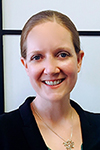 “It was twofold really,” Peterson said. “When we originally moved it to the Behavioral Health Pavilion at South Campus, there was a much stronger behavioral health focus in the topics, and it provided easier access for those professionals. It also provided easier parking for our attendees from the community.
“It was twofold really,” Peterson said. “When we originally moved it to the Behavioral Health Pavilion at South Campus, there was a much stronger behavioral health focus in the topics, and it provided easier access for those professionals. It also provided easier parking for our attendees from the community.
“Now, under our Geriatric Workforce Enhancement Program grant, we have more opportunities to do community-based education, so we wanted to refocus our Advances in Aging Lectures to health professionals, even though we’re still open to and expect great participation from the broader community and the public,” she added.
“Moving back to the UA Health Sciences campus also makes attending more convenient for a larger number of COM faculty, residents and students, as well as Banner – UMC staff.”
Dr. Taylor-Piliae is a Robert Wood Johnson Foundation Nurse Faculty Scholar and associate professor at the UA College of Nursing. Her clinical interests include cardiovascular disease prevention and risk factor reduction, Tai Chi exercise, physical activity among diverse groups of adults, falls and fall risk in stroke survivors, and improved physical and cognitive function in older adults for optimal health-related quality of life. She has received funding for her programs previously from the Arizona Health Education Center (AzAHEC) at the University of Arizona. The topic of her talk is:
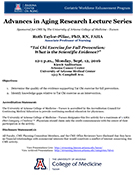 "Tai Chi Exercise for Fall Prevention: What is the Scientific Evidence?"
"Tai Chi Exercise for Fall Prevention: What is the Scientific Evidence?"
Ruth Taylor-Piliae, PhD, RN, FAHA
Associate Professor of Nursing
Monday, Sept. 12, 2016
12-1 p.m. – a light lunch will be served
Kiewit Auditorium, UA Cancer Center
1515 N. Campbell Ave.
View and post ![]() this flyer [PDF] (above left) to learn about Dr. Taylor-Pilae's lecture and Continuing Medical Education credits (1 AMA PRA Category 1 Credit(s)™) available to health professionals who attend.
this flyer [PDF] (above left) to learn about Dr. Taylor-Pilae's lecture and Continuing Medical Education credits (1 AMA PRA Category 1 Credit(s)™) available to health professionals who attend. 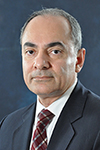
Naturopathic physician Babak Nayeri, DO, NMD, FABFM, FABMP (pictured right), was the inaugural speaker for this season’s lecture series, talking Aug. 8 about fall prevention with the topic, “Are Your Patients Falling for You?” Dr. Nayeri is an executive consultant to the Arizona Bureau of Tobacco and Chronic Diseases, Healthy Aging Program and Department of Health Services, and a UA clinical associate professor affiliated with the UA Center on Aging.
Other topics and speakers for the balance of 2016 in the lecture series are:
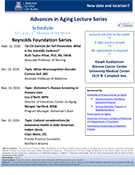 Oct. 10 — “Minor Neurocognitive Disorder,” Corinne Self, MD, UA Assistant Professor of Medicine
Oct. 10 — “Minor Neurocognitive Disorder,” Corinne Self, MD, UA Assistant Professor of Medicine- Nov. 14 — “Alzheimer’s Disease Screening in Primary Care,” Lisa O’Neill, MPH, UA Center on Aging education director education director, and Morgen Hartford, MSW, program manager, Alzheimer’s Association
- Dec. 12 — “Cultural Considerations for Behavioral Health in Elder American Indian Clients,” Cheri Wells, LPC, a private practice counselor in Flagstaff, Ariz., who has more than 15 years of experience working in behavioral health with Native Americans
To download a flyer for the full fall series of lectures, ![]() click here [PDF] or on the image at right.
click here [PDF] or on the image at right.
The talks also serve as the grand rounds lectures for the UA Division of Geriatrics, General Internal Medicine and Palliative Medicine, with which the UA Center on Aging is directly affiliated. The division is part of the UA Department of Medicine, which is the largest department in the UA College of Medicine – Tucson, with more than 200 faculty physicians, and a roughly equal number of physicians in training as residents in internal medicine and fellows in all of its subspecialties.
About the Arizona Center on Aging
The mission of the University of Arizona Center on Aging at the UA College of Medicine – Tucson is to promote long and healthy lives of older adults through coordinated programs in research, education, outreach and patient care. Established in 1980 as one of a network of Long Term Care Gerontology Centers authorized by the Older Americans Act, the UA Center on Aging was approved by the Arizona Board of Regents as a Center of Excellence at the Arizona Health Sciences Center in 1991. For more information, visit the center’s website, www.aging.arizona.edu

